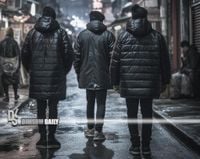As temperatures drop in Hong Kong, the Home Affairs Department has opened 18 temporary cold shelters across the city to assist those in need. This initiative, launched on March 29, 2025, comes in response to a Cold Weather Warning issued by the Hong Kong Observatory just hours earlier.
The cold weather is expected to bring minimum temperatures of around 12 degrees Celsius in urban areas and even lower in the New Territories, prompting the department to act swiftly. The temporary shelters will remain operational as long as the Cold Weather Warning is in effect, providing a safe haven for vulnerable individuals.
According to the Home Affairs Department, the shelters will offer clean mattresses, blankets, hot meals, and hot water at no cost to those seeking refuge from the chilly conditions. To ensure a peaceful environment for shelter users, donations from the public must be registered with staff before being placed in designated indoor locations. This allows the staff to inform users when they can collect these items, maintaining a respectful atmosphere for all.
Individuals looking for more information about the cold shelters or the donation process can call the department's hotline at 25728427. The shelters are strategically located throughout various districts, including Sai Ying Pun, Causeway Bay, Lei Tung, Wan Chai, Hung Hom, Lam Tin, Sham Shui Po, Wong Tai Sin, Yau Ma Tei, Tung Chung, Kwai Chung, Fanling, Hang Hau, Sha Tin, Tai Po, Tsuen Wan, Tuen Mun, and Yuen Long.
As the cold settles in, the Hong Kong Observatory has reported that a fresh northeast monsoon is affecting the Guangdong coastline, bringing cloudy skies and occasional rain to the region. On March 30, 2025, the weather is expected to remain cool and damp, with temperatures ranging from 12 degrees in urban areas to slightly lower in the New Territories. The maximum temperature is forecasted to reach 16 degrees, accompanied by moderate to fresh north to northeasterly winds.
Looking ahead, the weather conditions are anticipated to improve gradually from the middle to latter part of the following week as the northeast monsoon weakens, giving way to a drier easterly airstream. This transition will lead to a steady rise in temperatures, offering relief from the current cold snap.
This dual response to the cold weather not only highlights the city's commitment to supporting its most vulnerable residents but also underscores the importance of community involvement during such challenging times. The collaboration between the Home Affairs Department and the public reflects a shared responsibility to ensure that no one is left out in the cold.
As residents prepare for the chilly days ahead, the opening of these shelters serves as a reminder of the resilience and compassion that can emerge in the face of adversity. With the community's support, those seeking refuge can find warmth and comfort during this cold spell.
The Museum Summit 2025, which also concluded on March 29, showcased a different aspect of Hong Kong's vibrant cultural scene. Organized by the Leisure and Cultural Services Department in collaboration with The Guimet – National Museum of Asian Arts in France, the summit attracted over 7,000 registrants, with one-third coming from outside Hong Kong.
Held at the Hong Kong Convention and Exhibition Centre, the event brought together cultural leaders and professionals from renowned museums and institutions across 17 countries. The summit's theme, "Going Beyond," aimed to foster dialogue and networking opportunities among participants from diverse sectors including cultural institutions, galleries, educational organizations, and various industries related to museum services.
During the closing ceremony, Ms. Manda Chan, Director of Leisure and Cultural Services, emphasized the progressive developments in Hong Kong's cultural landscape. She noted the significance of institutions like M+ and the Hong Kong Palace Museum, along with the 15 museums and two art spaces managed by the LCSD. These institutions are crucial in telling the stories of Hong Kong's rich heritage.
Ms. Chan remarked, "Museums are no longer just about the past; they have become integral to the city's cultural life and an essential part of its identity." The summit also addressed contemporary issues such as cultural tourism, social wellness, and the role of technology in achieving sustainability within the museum sector.
In addition to discussions, the summit featured various extended programs for attendees, including local cultural visits and performances showcasing intangible cultural heritage. Participants had the chance to experience Cantonese Opera and Nanyin performances, visit local museums, and enjoy events like Museum Night at the Hong Kong Museum of Art.
As the summit wrapped up, attendees were set to continue their cultural exploration with visits to Shenzhen's museums, further enhancing the collaborative spirit fostered during the event.
The simultaneous occurrences of the cold weather response and the Museum Summit illustrate Hong Kong's commitment to both social welfare and cultural enrichment. As the city navigates these challenges and opportunities, the resilience and creativity of its people continue to shine through.






